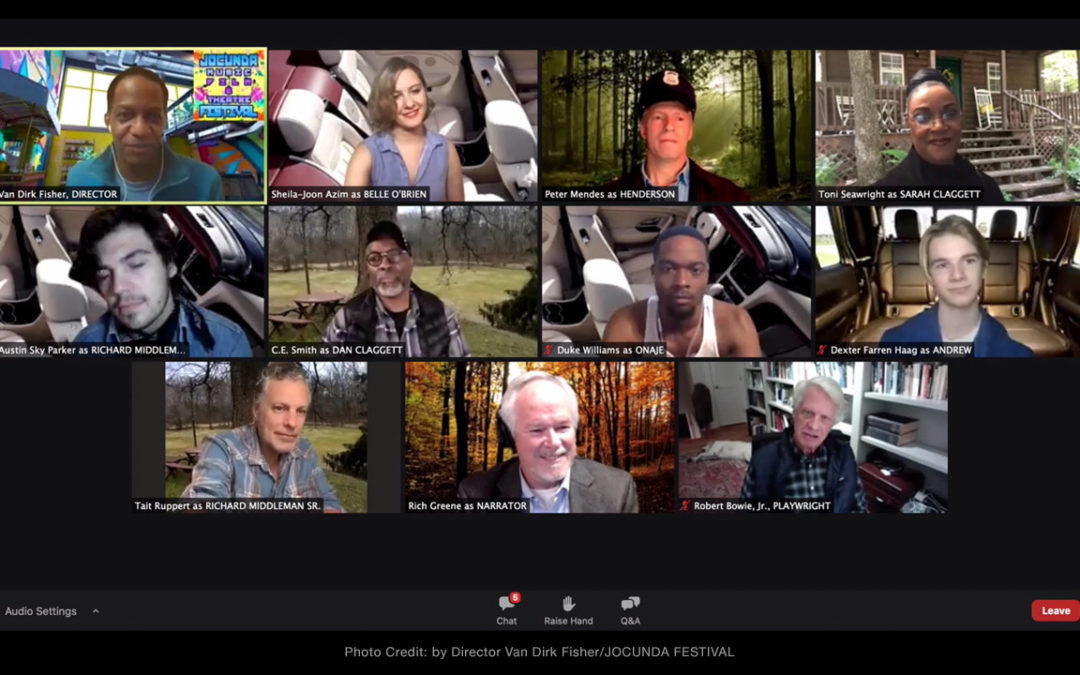
by Robert Bowie, Jr. | Oct 27, 2020 | Man Machine, ONAJE Update, Plays
Last Sunday’s Zoom performance of a staged reading of The Grace of God & The Man Machine may offer an introduction to the future of theater.
The new format was advanced by a remarkably effective merger of the immediacy of live theater and the dramatic impact of the cinematic closeup.
The actors Duke Williams, Toni Seawright, C.E. Smith, Austin Sky Parker, Sheila Joon Azim, Tait Ruppert, Dexter Haag, and Peter Mendes brilliantly rose to the occasion with only four rehearsals and Van Dirk Fisher, the director of the Riant Theater, before a large and universally appreciative but invisible audience, magnificently shaped a new art form.
Judging from the chat rooms and the talk back after the performance, it was a huge success.
Maybe this is the future of theater even after the pandemic is over. Theater has always been an art form for live audiences. Cameras were reserved for the waiting room for those who were late to the performance and videos of theatrical performances always fell flat but maybe it will be different now.
Director Van Dirk Fisher and the Riant Theatre placed virtual backdrops behind the actors and the actors, all separated and in some cases in different states, reached out and past a joint between each other and exited and entered as they stepped in or out of the camera in front of which they performed alone.
The traditional narrator became a character in the performance, offering stage directions and blocking instructions as if he was organizing his remembrances of the story.
The reading took on an immediacy that a staged reading cannot provide, but the degree of difficulty remained almost unnoticed for an audience which tuned in from New York to California.
The infectious immediacy of theater and the dramatic impact of the cinematic closeup? Why not? Live sports events come to life for the fans in attendance and at the same time offer the close up for those viewing the game at home.
Van, always the scholar, always the innovator, always pushing ahead, told me that Zoom is perfecting moving backgrounds, such as a view of the highway from the car in motion. Imagine theater sets that move to support the live action of the performances on stage.
This could be coming as the innovation created by these remarkable creative artists.

by Robert Bowie, Jr. | Oct 20, 2020 | Man Machine, ONAJE Update, Plays, Politics
It is unfair, but once again I am the lucky one. These people are unique!
This Sunday, October 25 at 8:00 pm (ET) my play, The Grace of God & The Man Machine, will be performed in a Zoom/virtual public reading by director Van Dirk Fisher and the Riant Theatre. CLICK HERE to get tickets.
When the theaters open up, it will be presented live on an open stage with audiences seated to watch it, but for now this performance is an example of an industry‘s remarkable ability to maintain itself and continue to create.
In early March of this year, we had just finished a table reading of the latest draft when New York started to shut down because of the pandemic. Just two days ago, nine months into this, Kevin R. Free, the New York director who ran that reading, begged on Facebook for people to please wear masks as he described the devastation on the performing arts industry and its 12 million artists:
“This is personal to us, our whole livelihood depends on social solidarity and we will not be labeled ‘non-essentials.’”
Artists have always been essential. They are the counterpoint to propaganda.
Now in an American election year which will define who we are, the theaters are closed. But this industry defines itself like no other: “The show must go on.”
In these times, an amazing cast of professionals (several of whom have Broadway credentials and all of whom are brilliant) are the ones to uphold this responsibility under these very difficult situations.
Artists in all forms are examples of independent courage. I found the same grit and determination when I first started to learn about writing for theater in Baltimore at the Baltimore Playwrights Festival years ago. I have come to love these people and this world which these artists create even though I am forever new to it.
There is a tenacity and courage in every member which is profound. Repeatedly, as I have met and worked with Van Dirk Fisher and the Riant Theatre on this production, and with others like Christian De Gré Cardenas and Mind the Art Entertainment, Sue Conover Marinello, Katie Marinello, and Parker Bennett, I have learned grit and courage from them.
For this production on Sunday night, I benefit from this resilience and creativity. Since the beginning of the pandemic, Van has responded to this nightmare by developing the art of virtual backgrounds and performance skills for virtual reality theatrical productions.
Think about that. You get knocked down you get back up.
Please join me and watch these remarkable people offer a counterpoint to the propaganda of an election year.
Come if you can. And if you can’t, please donate to support the theater if possible.
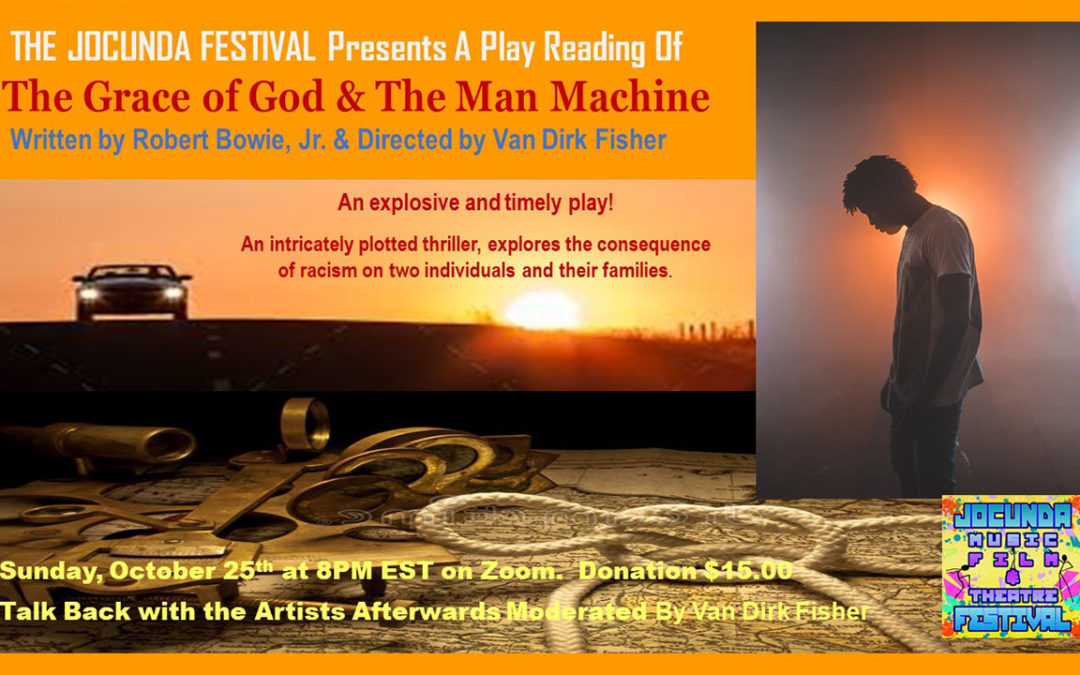
by Robert Bowie, Jr. | Oct 19, 2020 | Man Machine, ONAJE Update, Plays
I’m thrilled to share that a reading of my play, THE GRACE OF GOD & THE MAN MACHINE (formerly known as Onaje), will be presented by the Jocunda Festival this Sunday, October 25th, at 8:00 p.m. (ET). There will be a Q&A afterward with the playwright (yours truly), the director, actors, and audience, led by Van Dirk Fisher, the director and founder of the Riant Theatre.
I would be doubly thrilled if you could join us — and help support live theater.
For tickets, register in advance on Zoom:
https://us02web.zoom.us/webinar/register/WN_nS9PhZTyTMimDacMyxCCeA
Donation: $15.00 to benefit The Riant Theatre. After registering, you will receive a confirmation email with details about joining on Zoom.
THE GRACE OF GOD & THE MAN MACHINE, a Black Lives Matter play, is an intricately plotted thriller that explores the consequence of racism on two individuals and their families.
Set in Eastern Maryland in the 1960s and 1987, two sons — one white, one black — meet by chance on the road, unaware that their families shared a life-altering connection years before. Now, their fate and their families’ futures may depend on the choices they will be forced to make.
THE GRACE OF GOD & THE MAN MACHINE allows the audience to ponder: is the die forever cast by a one-time choice we make?
“Having run this Zoom Play Reading Series since the pandemic began, I’ve developed directorial and visual techniques that make our Zoom productions visually, emotionally, and viscerally stimulating,” director Van Dirk Fisher said. “It’s something people haven’t always associated with the play reading format. Audiences also love the interactive and spirited Q and A that follows,” he added.
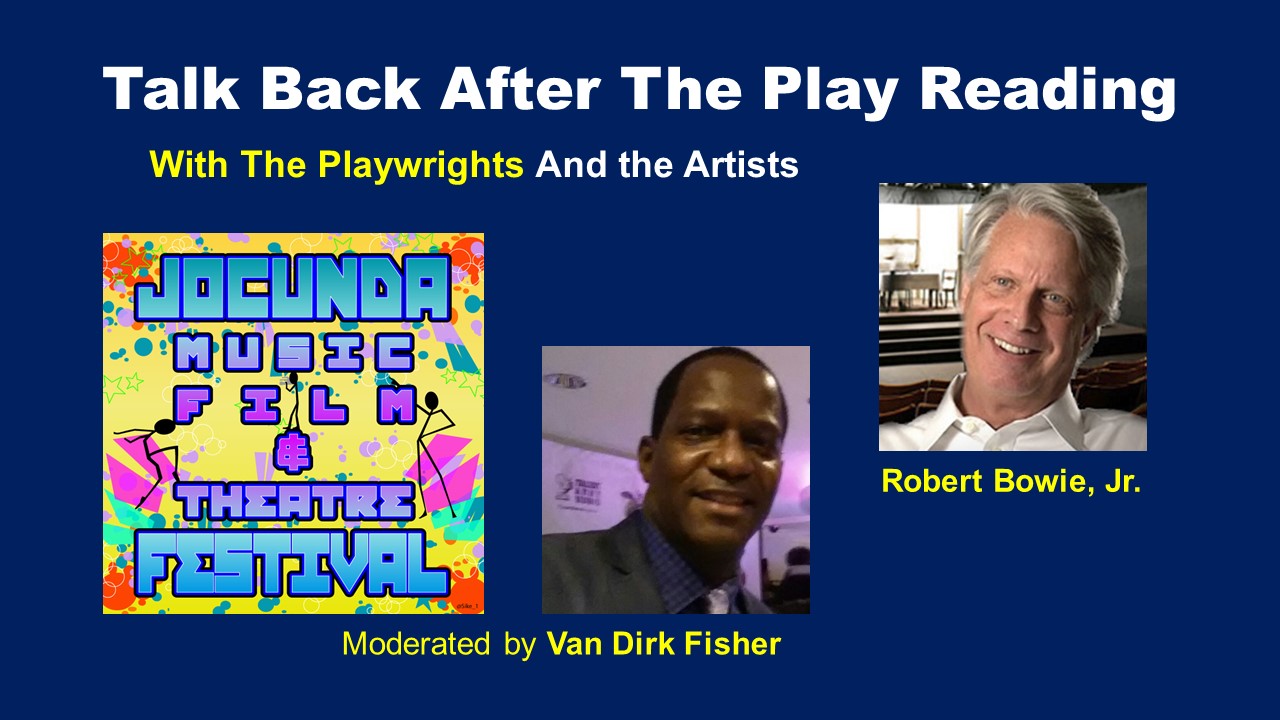
An O’Neill Theater Center semi-finalist, Onaje appeared at the 2018 Fringe Festival to rave reviews and sold out audiences. Theatre Is Easy gave Onaje its Best Bet designation and described its “high stakes story” as “the most dramatic, fleshed out near-cinematic play I have seen.” Onstage Blog said Onaje “brilliantly brings a sense of warmth,” and Blog Critic described the play as embodying “exquisite conceptualizations and themes.”
CLICK HERE to download the Press Release.

by Robert Bowie, Jr. | Feb 18, 2020 | Featured, Law, News, ONAJE, ONAJE Update, Operetta, Plays, Poetry
Okay, I may have a problem. I am a recovering lawyer and now aspiring playwright and poet. Is it possible that I miss time sheets? “Every six minutes” for a lifetime?
People used to say: “You are what you eat,” but what if you are what you “do” or have done?
Maybe I’m getting worse. At the law firm, I made a rule that if anybody could finish a story that I was telling I would stop telling it.
Now I don’t care. If I can get a second laugh or even a third from the same story I will repeat it, again and again. (And I’m going deaf so I’m the only one who doesn’t have to hear it.) It could be senility. It could be I’ve lost any sense of embarrassment, but it definitely demonstrates no merciful memory loss, at all.
The other thing is, even in retirement I must “work.” I have grown even more intolerant of delay because everything I’ve written should be on stage by now! Damn it!
What has happened to me?
In the past year, I have written or rewritten three plays. One (Onaje) has been produced in New York, two will be produced in New York (Vox Populi, for which I wrote the libretto, and The Grace of God & The Man Machine). Another, The Naked House Painting Society, is looking for a home.
Yes, I used to be impatient as a lawyer but now my stuff is not produced fast enough? Do I still need litigation? The need to measure work on massive conflicts in tight building blocks of measured time along with a new project have made me afraid.
I have started working on a poem based on Dante’s Inferno. Dante’s Inferno has 34 cantos and 23 six-line stanzas in each canto. That in itself was my wake-up call. How sick is this?
The law can definitely create “delusions of grandeur.” Might it also imprint the structured, ordered, anal impact of time sheets?
Is it now that I require 34 cantos and 23 six-line stanzas in each canto? Seriously? But I haven’t given into it yet, I think.
Still, as I started the Prologue and began to “write about what I know,“ I found a schizophrenic litigator’s theme begging for harmony. This is how it starts:
Prologue
With first light, or birth, or perhaps before/
And maybe after, comes the dialogue:/
The debate in the mind. Waves on the shore/
Each overriding the last. No monologue./
Two nagging voices in constant conflict./
One “as doubt“ the other “as hope,“ both spent/
Bickering on some path I did not pick/
Living the daily schedule of events/
As I wake and wonder where each day went:/
The debate in the mind. Waves on the shore/
Each overriding the last. What event,/
What plea, what prayer from my central core,/
What keeper of my life long travel log/
Can cure me of this endless dialogue?/
I start with a sonnet? How sick is this?
T.S. Eliot said:
“evenings, mornings, afternoons,/
I have measured out my like with coffee spoons;”/
And the poor man was just a banker.
Still, it will be funny and too long for me to repeat, so that may be progress.
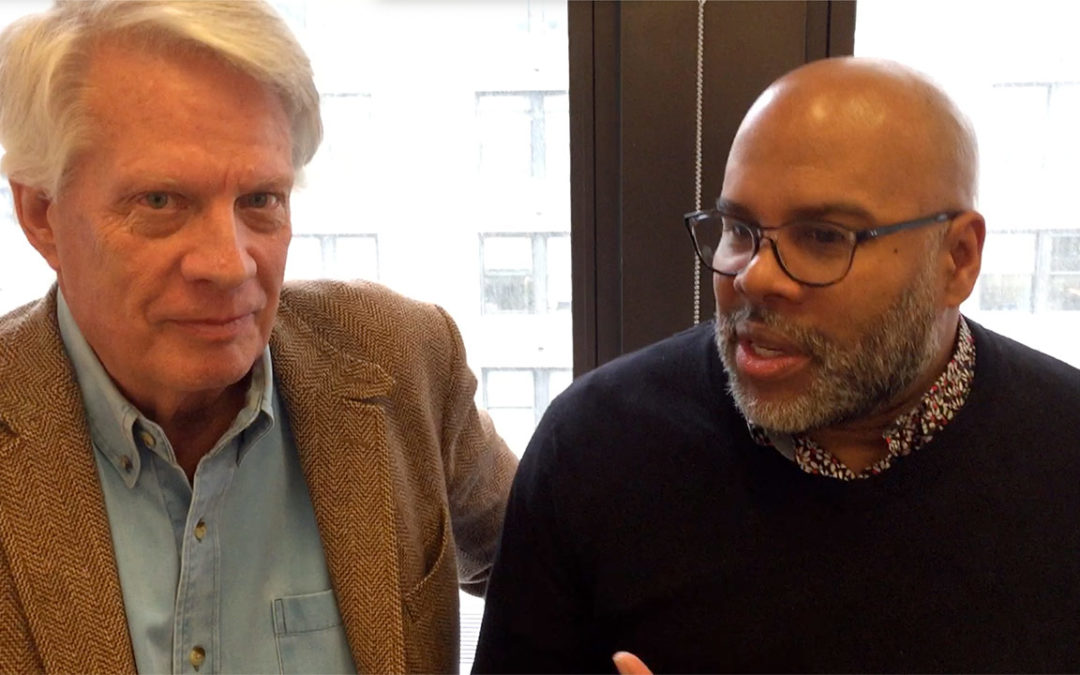
by Robert Bowie, Jr. | Feb 11, 2020 | FringeNYC, News, ONAJE, ONAJE Update, Plays
Spring is coming and we have a new lead producer and manager and a “new” play. Onaje is now The Grace of God & The Man Machine.
Mind the Art Entertainment is our new lead producer and manager, who will be working with Sue Conover Marinello.
This is a big deal for us. The money has been raised for two new “table reads” at the New York Opera Center in late February and in early March. The legal documents will be executed in mid-March and then we will start raising money for a production.
How did we get here?
After Onaje got the rave reviews at FringeNYC, Kevin R. Free and his agent John Essay took an interest and made suggestions to develop Onaje from a 93 minute one act to a full length two act. I went to work with Kevin.
Kevin and John have exposed me to a new and more polished professional performance, and Mind the Art has had numerous NYC productions, so both are big steps up. The performance dates will depend on fundraising and the acquiring of an off- or off-off Broadway theater, but we are focused and starting down this very challenging path.
All New York productions are expensive. This is a whole new world. It appears to be more about love and community than money. Most investors, large or small, love the theater and want to be part of the excitement. They are just plain “riverboat gamblers,” if they care about the investment at all. (The producers tell their investors that there is a high likelihood they will not get their money back because only a very small percentage of New York productions are successful investments.)
Over the last months, Kevin and I have met several times and I have been open to and impressed by his ability to X-ray the script and study its bone structure and life force.
We have become friends, and out of that friendship has come a much deeper and more powerful and relevant play because we were vulnerable and shared the differences of our lives.
As we worked on the play I have been surrounded by, and have commented on the politics of the present day.
Those of you who came and saw the production of Onaje remember that it derives from the civil rights riots in Cambridge Maryland in 1967 and its aftermath.
I have discovered that the wellspring of the play and the divisions within our country derive from our first beginnings as a nation. But also from that wellspring has come deep, loving, committed relationships and even great humor. That is what the new play is about.
The support and belief of Mind The Art Entertainment has also been born out of friendship. Christian and Patrick commissioned me to write the libretto for Vox Populi based on the success of Onaje at FringeNYC. The year before, Christian, Sue, and I met in Wallingford, Connecticut at a class for producers at the O’Neil.
The beauty of this creation is it comes from divergent backgrounds and is born from respect and friendship. It is in direct contrast with what this country is presently going through. The new play incorporates the present and our nation’s past.
Cross your fingers and wish us “break a leg!” It will be an interesting year ahead of us!
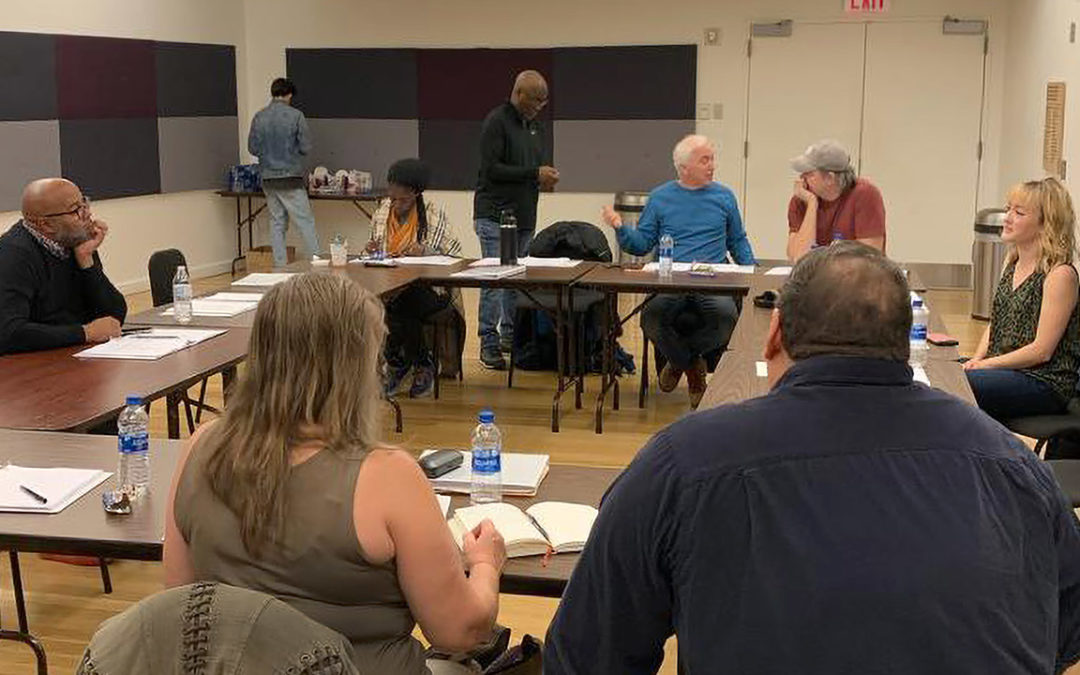
by Robert Bowie, Jr. | Nov 19, 2019 | Featured, ONAJE, ONAJE Update, Politics
Sometimes, it seems as if Amtrak travels through America’s subconscious.
Last Sunday, on a cloudy afternoon, I took the train up to NYC for the “table read” of my new draft of Onaje. I put The New York Times on the seat next to me and looked out at the graffiti on the abutments of the bridges and junked cars in back yards.
We are divided by our politicians, but are we now divided from our children too? I had read about why the “millennials” blame the “baby boomers” for the world they have inherited and had wondered if there was a common beginning to all of this.
The millennials don’t have the ”spoiled child” anger of “sex, drugs and rock & roll” and “never trust anyone over the age of 30,” which was the mantra of my generation. Their anger is the residue of all that.
We were born into the rich, expanding post-war economy. They want a job to pay off the student loans for the education to get the job they never got.
How could this have happened?
To placate us, President Lyndon Johnson, ended the draft. Our parents — all of them — had been drafted and went to war together to defeat fascist nation states and rebuild a capitalist Europe, to allow free trade to rebuild the devastated nations that we had defeated, and then to break down walls to offer freedom for others.
For the college-educated boomers, it had been acceptable to avoid the draft, because we didn’t approve of the war.
Unintentionally, by doing so, we split the nation the millennials inherited into the privileged rich who would not, and the working poor who would fight our future foreign wars and salute our flag, after the privileged draft-dodgers had felt free to burn it.
The thing is, the “privileged” never followed through. After we graduated, the Peace Corps and public service became old news. We had bumper stickers that said: “The One Who Dies With The Most Toys Wins.”
We were too self-obsessed to notice that the seeds which had created WWII were composting here in our country as we let the economics of disenfranchisement grow.
NAFTA would bring those seeds to bloom with immigration reform. It was predestined, as the privileged got richer and the jobs of the working poor left town, and women still remained unprotected ( “Me Too”), and the city slums expanded ( “Black Lives Matter“). The white working poor were easily fanned into racist hate as they were left behind.
It was painfully ironic on Monday, at the reading, when the actors brought the past into the present. They brought to life a play about savage racist riots which happen in 1967, just as the early boomers went off to college.
It was painful to see how the cast of white and black Americans could so brilliantly bring the hate and violence between the races to life, and then break from their characters and become friends so easily and talk and laugh. It stood in stark contrast to the story of the play and to the anger presently in our country, now so divided that even families are unable to communicate.
How could this be? It may be that the actors had a common goal that was bigger than any individual in that room. They needed each other and enjoyed each other as they brought that common goal to fruition.
Perhaps the boomers thought only of themselves. The one percent now has all the toys. In the end, we are what we do, not what we say. We said we were ”peace and love,” but we had no commitment to anything other than to our avarice and greed.
We earned Trump and his bone spurs. He is one of us.
I have provided the names of these wonderful actors. Watch for them on TV and on the New York stages. They are each and everyone of them brilliant: Joe Dellger, C.E. Smith, Tim Rush, Khiry Walker, Adam Couperthwaite, Laura Darrell, Mary E. Hodges, Johnny Shea, and Erin O’Brien.







